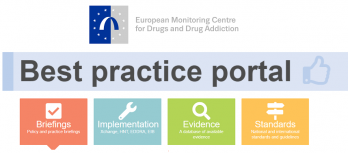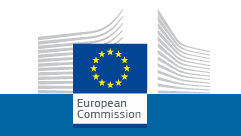"The promotion and strengthening of cooperation mechanisms within the framework of the COPOLAD programme have enabled Guatemala to strengthen programmes and plans on drugs and addictions with full observance of Human Rights"
ReturnPublished on 10/05/18
The Commission Against Addictions and Illicit Drug Trafficking -CCATID-, attached to the Vice-Presidency of the Republic, is created in 1992 through the promulgation of the Law Against Drugs, Decree 48-92, as the body responsible for studying and deciding national policies for the prevention of addictions, illicit actions associated with drug trafficking in all its forms and related activities and providing timely and effective treatment to drug-dependent people.
In 1994, the Executive Secretariat of the Commission against Addictions and Illicit Drug Trafficking -SECCATID- was created as an entity in charge of coordinating the implementation of the policies emanated from the CCATID. the Executive Secretary is responsible for the implementation of policies designed for the prevention and treatment of drug dependencies dictated within the CCATID aimed at reducing the undue demand for drugs and other addictive substances, the treatment and rehabilitation of people with problematic drug use, the coordination of research and epidemiological, scientific, pedagogical studies to address the drug problem and also to advise the Ministry of Governance specifically on drugs issues.

- In 2012 the Presidents of Colombia, Mexico and Guatemala sent a letter to the UN Secretary-General asking to review the drug policy approach, leading to the celebration of the UNGASS in 2016. Six years after that request, how is the situation in Latin America from Guatemala's perspective?
The current situation of the complex and multicausal phenomenon of drugs in Latin America is influenced by many factors that raise advances and at the same time challenges for addressing this topic. In Guatemala, variables such as the necessary strengthening of multisectoral coordination, the need for an urgent budget increasement to address addictions at the prevention and treatment area and the personal need to take care of programmes aimed at the area of demand reduction, have been identified as some of the great challenges for a better attention to the problem from a holistic, balanced, multidisciplinary, evidence-based approach with full respect for human rights and fundamental freedoms.
Since the beginning of 2016, the plenary of the Commission Against Addictions and Illicit Drug Trafficking -CCATID- granted the mandate to the Executive Secretariat of the Commission -SECCATID- to coordinate the elaboration of a new public policy for the Approach to Drugs and Addictions, which contemplates in its content, objectives and strategic guidelines aligned with the objectives of the government and framed within the approach of public health, human rights, security, justice, integral development, education, international principles, taking into Consideration the goals of the 2030 Agenda for Sustainable Development (SDG) as well as other international commitments and guidelines.
The content and scope of such public policy have also been enriched by the issuance of the Plan of Action 2016-2020 of the 2010 CICAD/OAS Hemispheric Strategy on Drugs and the recommendations expressed in the final document of the UNGASS session 2016. The policy, which is expected to be approved this year, will cover the axes of Institutional Strengthening, Demand Reduction, Supply Reduction, Development and Human Rights and International Cooperation.
- Which are in your opinion the main challenges for the country in the context of the Central American reality with the purpose of generating balanced, effective and evidence-based policies?
Some of the main challenges that Guatemala is facing in this regard are related to the need to strengthen the synergy, coordination and inter-institutional commitment to generate the exchange of valid, reliable and relevant information in the field of drugs. Currently, the development of scientific studies in the areas of demand as well as supply reduction in the region is considered vital, given that this contributes to the search of alternatives that provide answers to the needs that the different population groups present, including the context itself, as well as the gender perspective, ethnicity, age group among others. There is a clear imbalance in the budget, allocating a greater percentage to the area of drug supply reduction, minimizing the resources for drug demand reduction without prioritizing the health consequences and the high economic, social and security costs that this represents.
- In the study on National Drug Observatories of the CELAC published by COPOLAD in 2017, it was revealed, among other issues how the need of inter-institutional coordination and the provision of human and economic resources are necessary for the creation, maintenance and development of an NDO. After the impulse to the Observatory of Guatemala, what are the next steps to consolidate it and how can COPOLAD contribute to its reinforcement?
As SECCATID, we consider it essential to conclude the formation process of the Drug Information Network in Guatemala (RID) coordinated by the National Drugs Observatory as part of its process of continuous and sustainable strengthening, achieving the commitment of all the entities involved and in such a way, to achieve a flow of information. Likewise, increasing the human and technological resources is a vital aspect to continue with the strengthening and consolidation of the NDO as part of SECCATID, in its capacity of the permanent body to collect, document, organize, systematize and analyze national and international drug information and statistics. To date, COPOLAD has been a very important strategic ally in strengthening the National Drugs Observatory of Guatemala and its support continues to be essential through counseling, guidance, exchange of best practices, follow-up and monitoring.
- What are the main benefits of COPOLAD having chosen your country as part of the case study to reinforce institutional capacities in Alternative Development?
The (2015) Executive Report of the Vice-Ministry of Rural Economic Development of the Productive Conversion Directorate of the Ministry of Agriculture, Livestock and Food refers to the estimation of 2.000 potential hectares for poppy cultivation in the departments of San Marcos and Huehuetenango, with a potential for profitability of $6 billion a year, with a process of 3 agricultural production cycles per year, aspects that represent challenges to the establishment of alternative programmes to modify this Illicit socio-economic condition causing ungovernability in the region where power groups take control of the population and their economy. Poor public or private investment in these remote areas and the lack of opportunities for social development make communities vulnerable, increasing the likelihood of their involvement in illicit actions, such as large-scale poppy, and recently marijuana, production.
Therefore, SECCATID has sought the support of strategic allies to help guide the country's actions and thus turn them into good practices, such is the case of the support provided by the of Cooperation Programme between Latin America and the European Union in Drugs Policies (COPOLAD) and the Deutsche Gesellschaft für Internationale Zusammenarbeit (GIZ).
Through this support, it has been understood that Alternative Development and the implementation of value chains constitute a commitment and a common and shared responsibility that will have long-term positive results for the communities and therefore for the country, for which it is essential to integrate the issue into State policies.
- Which specific measures has Guatemala been able to implement in the area of AD after its participation in the intra-regional Forums and the horizontal training workshops organized by COPOLAD in this field?
The "peer to peer" horizontal learning workshops, with emphasis on value chains and intra-regional dialogue forums, have allowed the following:
- To identify the institutional capacities to develop a work route at the local level, of the next actions that we must carry out as a country, starting with the coordination and the participation of strategic allies and the building a work team, for the successful execution and sustainability of Alternative Development programmes.
- To strengthen the evidence that exists in the country in this area, promoting the elaboration of diagnoses and studies that allow to carry out a livelihood analysis of the communities and thus to incorporate alternative development programmes that contribute to the development of communities and encourage them to make efforts to ensure the sustainability of the projects.
- To know the best practices and methodologies such as "value links" which will contribute to strengthening the processes that is currently carried out in the country.
- To what extent does the exchange and dialogue with other international actors within the framework of COPOLAD contribute to the strengthening of progressively more effective and human rights-respecting drugs policies in Guatemala?
Dialogue and cooperation with other actors has enabled SECCATID, as a state agency in charge of coordinating policies designed for the prevention and treatment of drug dependence, to broaden its knowledge, getting to know best practices and lessons learned from other international actors, which has contributed to enrich the content and scope of public policy whose development is coordinated by SECCATID.
The promotion and strengthening of cooperation mechanisms within the framework of the COPOLAD programme have enabled Guatemala to strengthen programmes and plans on drugs and addictions with full observance of human rights.
Currently, COPOLAD collaborates with our institution from different areas of the problematic of drugs and addictions, promoting the exchange of good practices and providing spaces for the development of competencies that cooperate with the good performance of the actions needed to meet the needs that are held as a country in the field of drugs and the funding that enables SECCATID to participate in the various international forums organized by COPOLAD.
Downloads
-
Activity Report Guatemala 2017-2020 (Spanish) File JPG. 79.8 Kb
The European Commission is preparing a third phase of this programme, therefore COPOLAD will be back at the beginning of 2021.









